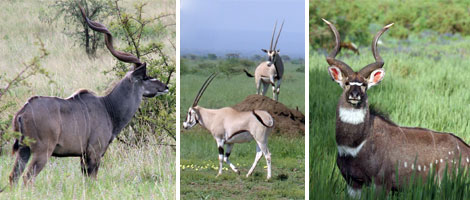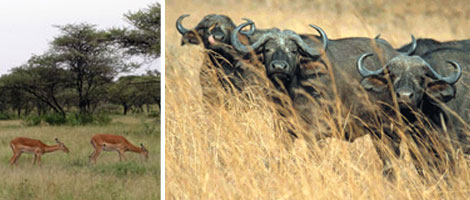Country summaries: East-Africa
We have summarised some of our main findings from each country into separate booklets that can be downloaded here.
Hunting in Ethiopia
Ethiopia is a country exceptionally high in globally unique biodiversity, however wildlife populations throughout the country have been reduced to a fraction of what they were due to a number of causes, including hunting. This appears to have several root causes, including cultural traditions, subsistence, buffers during famines and reprisal against government. Several national parks and controlled hunting areas are spread across the country, but the institutional and financial capacity for protected area management is low and benefit sharing mechanisms with communities are lacking. Hunting management is highly focused on revenue derived from concessions and trophy fees, particularly those targeting the endangered mountain nyala - the world’s rarest mammal still subject to commercial harvest. HUSA examines the multiple drivers and impacts of hunting in both highland and lowland areas and assesses the potential for benefit sharing to help develop sustainable approaches to wildlife conservation.

Photo: M. Ewnetu, L. Berhanu, A. Nelson
Hunting in Tanzania
The Tanzanian component of the project focuses on the role and impacts of hunting in the Serengeti ecosystem,
which is famous for the largest herds of migratory ungulates in the world. Two million wildebeest, zebra and gazelle migrate annually from the short grass plains of Ngorongoro and Serengeti to the Mara River. These migratory herds, coupled with resident ungulates, support around 10 000 hyenas and lions as well as other megafauna, making the Serengeti one of the most important ecosystems for mammals in Africa.
Illegal hunting is considered a serious threat to wildlife in the Serengeti ecosystem. Previous studies suggest that poverty and lack of alternative sources of protein are the primary drivers of local bushmeat consumption. However, the cultural, socio-economic and ecological basis and consequences of bushmeat hunting in the Serengeti ecosystem are not completely understood. HUSA provides scientific knowledge on these issues to help mitigate illegal bushmeat hunting and foster sustainable wildlife management in the Serengeti ecosystem.
For updates, comments and questions please contact: Anke Fischer

Photo: C. Næss, J. Linnell